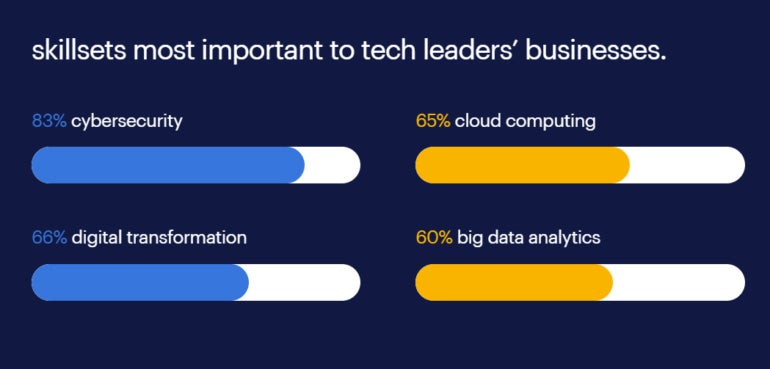Source: www.techrepublic.com – Author: Ben Abbott

The IT skills shortage is no secret to Australia’s technology managers. Whether they’ve been hiring new talent into their teams or looking to keep their existing talent engaged and in place, the short supply of skills in recent years has made it quite a challenging time.
Scott Brown, who heads the new Talent Services offering at IT solutions and managed services provider Logicalis Australia, said it has been a unique period to be watching IT recruitment.
“I’ve never seen anything like the last two to three years. It’s been haywire,” Brown said.
The skills shortage is causing IT leaders to spend more on talent, with skill sets like cyber security and AI in demand in 2023. Logicalis has also launched a Talent Services business to help IT leaders meet skills needs and get projects done without hiring staff directly.
Jump to:
- CIOs are spending more on IT talent attraction and retention
- Cyber security, artificial intelligence leading IT skills demand
- Logicalis meets market demand with Talent Services launch
- IT leaders should expect skills shortages in the future
CIOs are spending more on IT talent attraction and retention
Australian organisations continue to face a hyper competitive market for local IT talent.
While tech sector employees did suffer through a round of layoffs in early 2023, led by U.S.-headquartered companies brutally shedding their local workforces, demand from local employers, the skills shortage and fast-paced change have seen these staff absorbed back into the workforce.
“We’ve run into a perfect storm of a low unemployment rate and immigration still recovering from pre-pandemic levels,” Brown said. “Many organisations are finding that getting their hands on the right employees and capabilities at the right time is a core challenge they are facing.”

Logicalis’ Australia CIO Report 2023, for example, found that talent was one of the top three areas where CIOs were planning to increase spending this year. Just over three quarters (77%) of CIOs surveyed said they were planning to boost spending on hiring and retaining talent.
SEE: Many organisations are worried about employee retention.
“Organisations can either develop people and capabilities at the right speed, or if I can’t, they can go out and buy or borrow that talent for the right situation,” Brown said. “And if you look at the core technologies, the pace of change is about as fast as any other industry out there.
“CIOs are increasing spending to attract and retain talent and bridge the skills gap. At the same time, they are asking if they have the capacity to do what they want to do.”
Cyber security, artificial intelligence leading IT skills demand
Logicalis Australia sponsors Grad Girls, a career support program for female STEM students run by the Victorian Information Communication Technology for Women Network. At an event in 2023, it was clear where graduates saw the opportunities of the future.
“Ninety per cent of attendees were doing either AI, cyber security or data science,” Brown said. “That’s an indication for us of where the market is going. These are technologies where the market has not kept up with demand and is expected to grow exponentially.”
Cyber security and data science roles feature heavily on in-demand tech job lists for 2023. So do IT project managers, software developers, business analysts and network engineers. A Randstad Australia survey found cyber security roles were the most in-demand skill set and highest-growing job by headcount. The highest specific skills areas in demand were DevOps and continuous integration and deployment skills, cloud, development languages, cyber security skills and test automation.
Figure A

But the big growth area for this year is AI. A survey conducted by Robert Half found that generative AI was having a huge impact on hiring plans, with 30% of employers surveyed having shifted their focus to different IT skills that are more in demand due to AI advancements. The survey found 34% had hired contractors or consultants to bring in specialised skills, 33% had increased hiring to keep up with innovation and 23% had outsourced certain projects.
Randstad’s survey also found AI, automation and robotics skills were in the shortest supply in the market, while expecting the second largest growth in headcount (behind cyber security).
Robert Half’s senior managing director for APAC, David Jones, said generative AI may change how work is done, but that does not mean it will eliminate jobs in the process.
“It is in the environment of automation by and with AI that new job profiles are emerging that need people more than ever,” said Jones. “While there is a growing demand for workers who hold these skills, employers know it’s an emerging field and are willing to facilitate the upskilling of staff.”
Logicalis meets market demand with Talent Services launch
Logicalis Australia launched its Talent Services business to help customers get their hands on the IT skills and capabilities they need at the right time to be able to get IT projects done.
A fully managed solution, it offers remote, hybrid or on-site tech professionals while taking care of payroll, onboarding, performance management and renewal or disengagement.
Despite the market-wide talent shortage, Logicalis Australia says its access to a wide talent network means it can provide a shortlist of candidates within 48 hours of receiving a brief.
“Going out and hiring full-time is the traditional model, but that’s evolving,” said Brown. “We find there are core roles, and our service sits around that team, offering agility, capacity and capability.
“It reflects the needs in the market. They may not have the opex budget to hire five roles and deal with that commitment. This can be a low-risk option for organisations.”
The biggest change in the market now is the speed at which enterprise IT teams are moving.
“People are asking, ‘Can we do this now?’” Brown said. “They have projects banking up. As one thing rolls over, it banks up the next project. If they can bring someone in for three months, we find they are not having to delay those projects.”
Brown adds that because players in the tech sector are not sure what the future holds for the economy, augmenting teams in this way could increase flexibility during uncertainty.
IT leaders should expect skills shortages in the future
Logicalis Australia is not expecting a significant shift in the skills available in the market over the next 24 months. Brown says there’s “not enough talent in those emerging tech areas.”
He says the skills gap is even driving different types of candidates to seize opportunities.
“People are seeing opportunities because of where things are going in the market, and it is clearly going to take a long time to catch up to the trend of supply and demand,” Brown said.
Brown adds that current economic pressures will push organisations to evolve faster and pursue further automation, driving even further demand for technology skills to support change.
Original Post URL: https://www.techrepublic.com/article/it-recruitment-resourcing-trends-australia/
Category & Tags: Artificial Intelligence,Australia,CXO,International,Security,Tech & Work,ai,artificial intelligence,australia,cybersecurity,employee retention,it recruitment,it skills,it skills shortage,it talent,logicalis australia,recruitment trends,skills shortage – Artificial Intelligence,Australia,CXO,International,Security,Tech & Work,ai,artificial intelligence,australia,cybersecurity,employee retention,it recruitment,it skills,it skills shortage,it talent,logicalis australia,recruitment trends,skills shortage
Views: 1




















































